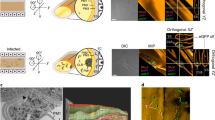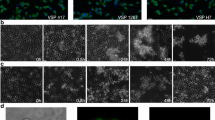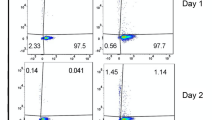Abstract
MANY protozoa possess mechanisms by which they are able to recover from immobilisation by specific antibodies. Paramecia have been shown to shed their ciliar antigens in response to specific divalent antibodies. After shedding the antibody bound antigens the animals present new antigens of different specificity1. It has been suggested that this modulation process also has a role in antigen variation in trypanosomes2. While modulation of serotypes in Tetrahymena pyriformis is primarily provoked by temperature shifts or changes in culture conditions3, induction of modulation in response to antibody agglutination has been reported4,5. Tetrahymena recovery from antibody provoked immobilisation has also been reported to occur by a nonspecific process not involving a change in serotype. Immobilised animals have been shown to secrete a substance which permits their recovery and protects animals of unrelated serotype from homologous anti-serum6–8. We have further examined the way that Tetrahymena recover from antibody provoked immobilisation. This process, which we call fabulation, apparently involves the proteolytic cleavage of both bound and free immunoglobulin to produce univalent fragments which bind or remain bound to the ciliar antigens and protect the animals from further antibody treatment with no apparent effects on cell growth. The cleavage seems to be catalysed by both cell bound and secreted proteases.
This is a preview of subscription content, access via your institution
Access options
Subscribe to this journal
Receive 51 print issues and online access
$199.00 per year
only $3.90 per issue
Buy this article
- Purchase on Springer Link
- Instant access to full article PDF
Prices may be subject to local taxes which are calculated during checkout
Similar content being viewed by others

References
Beale, G. H. The Genetics of Paramecium aurelia (Cambridge University Press, New York, 1954).
Takayanagi, T. & Enriques, G. L. J. Parasitol. 59, 644–647 (1973).
Allen, S. & Gibson, I. in Biology of Tetrahymena (ed. Elliott, A. M.) 307 (Dowden, Hutchinson and Ross, Stroudsberg, Pennsylvania, 1973).
Margolin, P., Loefer, J. B. & Owen, R. D. J. Protozool. 6, 207–251 (1959).
Juergensmeyer, E. B. J. Protozool. 16, 344–352 (1969).
Robertson, M. J. pathol. Bact. 48, 305–322 (1939).
Harrison, J. A. in Biological specificity and growth (eds Butler, E. G. el al.) 141–156 (Princeton University Press, Princeton, 1956).
Loefer, J. B., Owen, R. D. & Christensen, E. J. Protozool. 5, 209–217 (1958).
Viswanatha, T. & Liener, L. Arch. biochem. Biophys. 61, 410–421 (1956).
Dickie, N. & Liener, L. Biochem. biophys. Acta 64, 52–59 (1962).
Porter, R. R. Biochem. J. 73, 119–126 (1959).
Laemmli, U. K. Nature 227, 680–685 (1970).
Author information
Authors and Affiliations
Rights and permissions
About this article
Cite this article
EISEN, H., TALLAN, I. Tetrahymena pyriformis recovers from antibody immobilisation by producing univalent antibody fragments. Nature 270, 514–515 (1977). https://doi.org/10.1038/270514a0
Received:
Accepted:
Issue Date:
DOI: https://doi.org/10.1038/270514a0
Comments
By submitting a comment you agree to abide by our Terms and Community Guidelines. If you find something abusive or that does not comply with our terms or guidelines please flag it as inappropriate.


